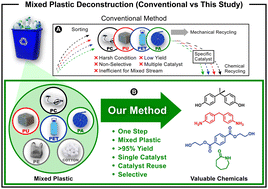Selective deconstruction of mixed plastics by a tailored organocatalyst†
Abstract
Plastic represents an essential material in our society; however, a major imbalance between their high production and end-of-life management is leading to unrecovered energy, economic hardship, and a high carbon footprint. The adoption of plastic recycling has been limited, mainly due to the difficulty of recycling mixed plastics. Here, we report a versatile organocatalyst for selective glycolysis of diverse consumer plastics and their mixed waste streams into valuable chemicals. The developed organocatalyst selectively deconstructs condensation polymers at a specific temperature, and additives or other polymers such as polyolefin or cellulose can be readily separated from the mixed plastics, providing a chemical recycling path for many existing mixed plastics today. The Life Cycle Assessment indicates that the production of various condensation polymers from the deconstructed monomers will result in a significant reduction in greenhouse gas emissions and energy input, opening a new paradigm of plastic circularity toward a net-zero carbon society.

- This article is part of the themed collections: Polymer Upcycling and 2023 Materials Horizons Most Popular Articles


 Please wait while we load your content...
Please wait while we load your content...